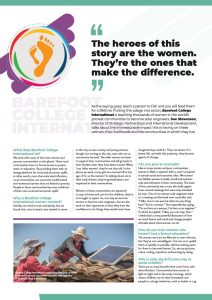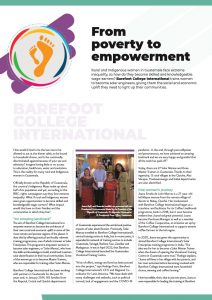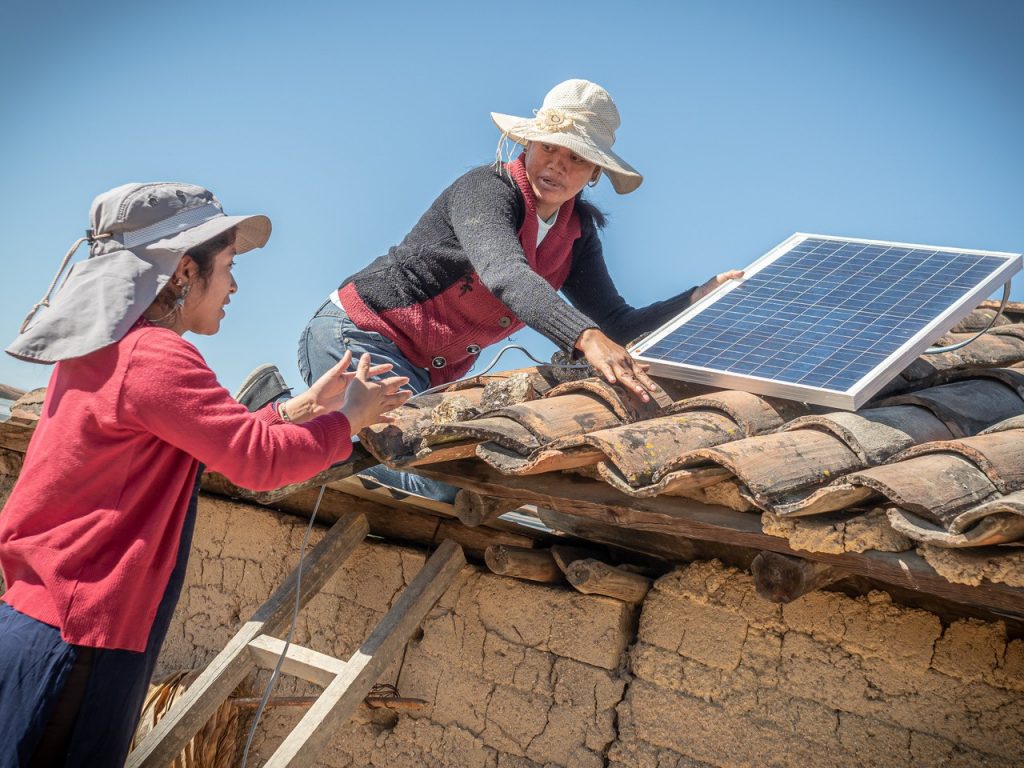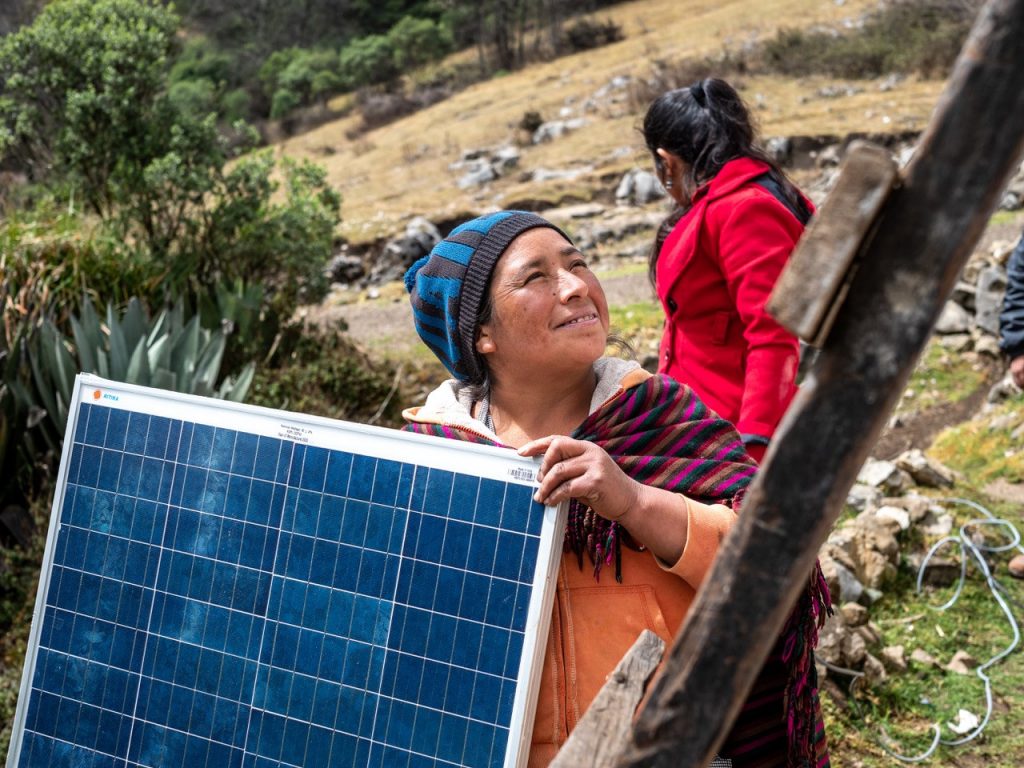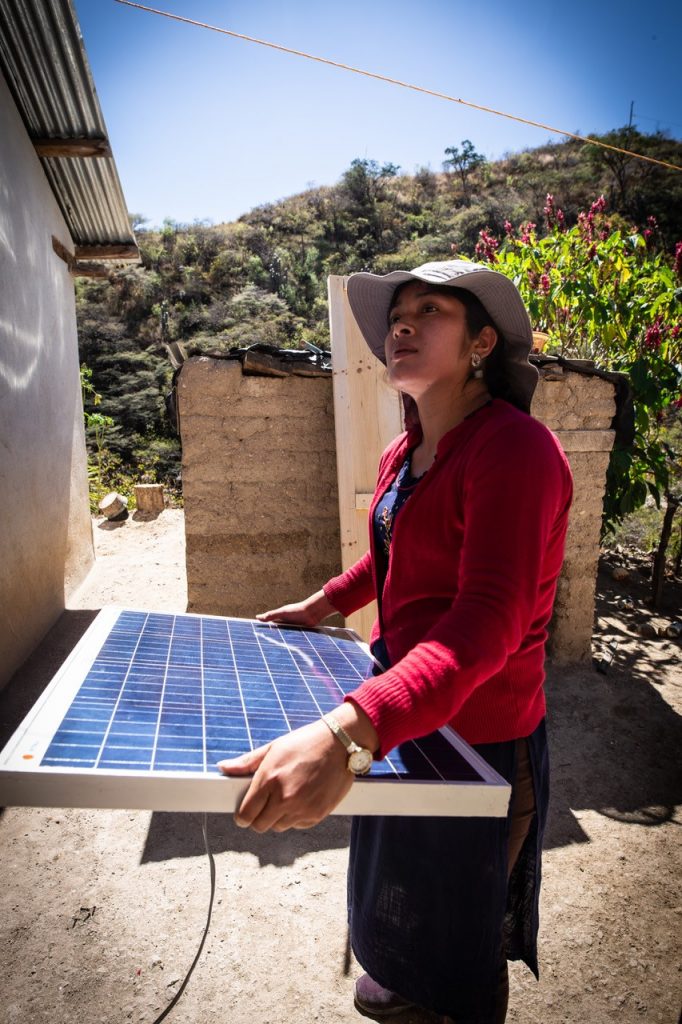Barefoot College International: “The heroes of this story are the women.”
As the saying goes, teach a person to fish and you will feed them for a lifetime. Putting this adage into action, Barefoot College International is teaching thousands of women in the world’s poorest communities to become solar engineers. Sue Stevenson, Director of Strategic Partnerships and International Development, talks about the immeasurable impact this is having on these women, their livelihoods and the communities in which they live.
What does Barefoot College International do?
We work with some of the most remote and poorest communities on the planet. These rural communities have no formal access to power, water or education. By providing them with an energy platform for social and economic uplift, in other words, more than solar electrification, rural communities can overcome multifaceted and numerous barriers that are linked to poverty. People in these communities become architects of their own social and economic uplift.
Why is Barefoot College International women-centred?
Initially, we tried to train everybody, but we found that, once trained, men tended to move to the city to earn money and young women, though not moving to the city, were also not as community focused. The older women are keen to support their communities and will go back to their families after they have been trained. When I say ‘older women’, they’re not that old. In the places we work, many girls are married off at the age of 12, so the women I’m talking about are in their early thirties; they’re grandmothers and respected in their communities.
Women in these communities are expected to stay at home and care for the children; they’re not taught to aspire. So, not only do we train women to become solar engineers, but we also work on their aspirations so that they have the confidence to do things they would never have imagined they could do. They can dream of a better life, and with this positivity, they become agents of change.
Can you give an example?
Like in many remote and poor communities, women in Mali, in western Africa, aren’t accepted in certain social and economic roles. We trained two Malian women to build, install and maintain solar electrification in their community. The head of this community was a man, who held regular town council meetings that were only attended by men. One of our woman solar engineers went to a meeting and the head town councillor said, “Hello, nice to see you but what are you doing here? You’re a woman.” She responded by saying, “I’m not here as a woman, I’m here as an engineer.” To which he replied, “Okay, you can stay, then.” I think that’s a very powerful illustration of how we reach hearts and minds and change people’s attitudes about what women can do.
How do you train women who haven’t had a formal education?
The women we train are illiterate or semi-literate, but they’re not unintelligent. Our aim is to upskill them as quickly as possible, without waiting years for them to become literate. So, we use pictures, colour coding, repetition and learning by doing.
Why is solar electrification key to social mobility?
There are so many benefits that come from solar electrification. Communities have access to light at night and in the early mornings, which means children can do their homework and people in cottage industries, such as basket or rug weavers, can work later in the evenings. It’s safer for people, particularly women, to walk around at night. Families, primarily women and children, are no longer subjected to hazardous fumes from kerosene lamps and there’s less risk of a fire. With solar power, it’s possible to have a water pump, which means women no longer have to spend hours fetching water and firewood. Instead, they can focus on their livelihoods, which is a key part of this.
How are solar engineers recruited?
In order to have a global reach, we work in partnership with non-governmental organisations (NGOs), such as the World Wide Fund for Nature (WWF) in Madagascar, for example, and community-based organisations (CBOs) – essentially, organisations that are well-known and trusted by the local community. These organisations contact us, and we go with them to the area where they work to help select suitable women trainees in an egalitarian way. What I mean by this is that the community is integral in helping us choose who attends the training. But, let me make this point very clear: it won’t be the wife or relative of the head of that community. That’s very important.
What is the criteria for being chosen?
We want women who have the drive to fulfil their aspirations for both themselves and those around them. Women who exist at the nexus of family, economic and social life and have the light of progress in their eyes.
What happens when the solar engineers return home after their training?
The idea is for them to build, install and maintain solar lighting systems in their local communities. We also have a conversation with the leaders of that community about portioning money that is traditionally spent on kerosene, candles and batteries to a community solar electrification fund. This fun has to be run by at least three women and two men – more women than men – and it is used to pay a solar engineer’s salary and replacing parts, if necessary.
Meet Sue
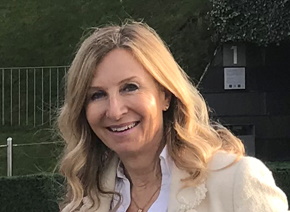
I stopped working when my husband got a job abroad, and I brought up our family, but I sat on various boards in the fields of education and the arts, including one at Stanford University in the US. When my youngest went to university, I decided to go back to work. I met the founder of the Social Work and Research Centre, started volunteering two days a week and then became employed full time. For me, this was serendipitous because I went from my double bottom line to the triple bottom line – financial, social and environmental impact.
What is the most rewarding aspect of Barefoot College International for you?
It’s the difference we make to the women. Let me share another story with you. Ten communities in the north of Senegal are very close to the Mauritanian border. These communities are a six-hour drive from what you would call a normal road. When the Barefoot College International team first went there to select women for the solar engineer training, they couldn’t see any women anywhere – only men.
Ten women were trained from December 2021 to March 2022 and the 10 communities became solar electrified in May. Now, if you go there, the women will greet you and the men stand respectfully behind them because they’re very proud of what these women can do. I think this is another brilliant example of how we genuinely change the social fabric of communities and the way women are regarded.
So, for me, it’s the improved social standing of those women that makes this work rewarding, or it’s the smile on the face of an 11-year-old girl who once told me, “Until I came to this school, I didn’t think I was as good as a boy.”
That is a relatively short time for that level of impact.
The change we can make in 12-18 months is amazing. And just think what that means after 2, 3 or 4 years! There’s a saying: how do you travel a thousand miles? One step at a time. You have to start somewhere and then a ripple effect takes place. The heroes of this story are the women. They are the ones that make the difference.
Tell us about your background.
My degree was in economics, and when I graduated, I worked for IBM (a technology company) as a systems engineer. I then went into marketing and worked in the US or Belgium and France. When I was based in the UK in the 1990s, I was seconded as Director of Business in the Environment. HRH King Charles III was its president, and the objective was to prove to for-profit companies (PLCs) that it’s possible to be environmentally sustainable and make a positive difference to the economy. It centred on the idea of the double bottom line, i.e., measuring a for-profit’s business performance in terms of financial profit or loss – the bottom line – and adding a second bottom line to measure its positive social impact. We were so successful that two of my board members, who included CEOs from major UK businesses, were given knighthoods. They didn’t receive these titles solely off the back of Business in the Environment, but it was a contributing factor.
About Barefoot College International
Barefoot College International was set up in 2015 to be a fit-for-purpose global entity, with all of the staff moving to it from the Social Work and Research Centre. Its mission to forge a unique women-centred network, dedicated to sustainable development for marginalised rural communities around the world. Its programmes cover 14 of the 17 UN Sustainable Development Goals.
Barefoot College International’s flagship programmes are Solar Enterprise and ENRICHE, designed to create solar engineers, educators and entrepreneurs. Over 3,000 women have been trained in 93 countries and 125,000 households have been solar electrified. These women go on to train other women and there are more than 2.2 million direct beneficiaries.
Solar – Solar engineers are trained to build, install and maintain solar electrification systems in their local communities.
ENRICHE – Women embark on an empowerment journey to give them the confidence, skills and knowledge to reach their full potential as agents of sustainable change.
Ecological livelihoods – This programme is key to economic uplift. Led by women, rural communities are supported to transition to regenerating agriculture and land management and includes livelihoods such as beekeeping and turmeric, cacao and coffee farming. Aspects of Solar Engineering also fall under this programme.

